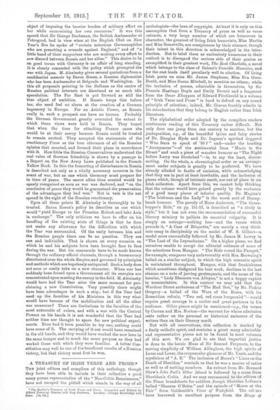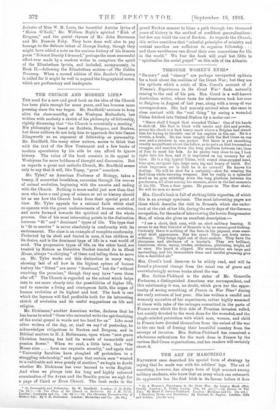A TREASURY OF IRISH VERSE AND PROSE.* THE joint editors
and compilers of this anthology, though they have been able to include in their collection a good many poems representative of the " Neo-Celtic Renaissance," have not escaped the pitfall which stands in the way of all
• The Reciter's Treaeury of Trish Versa and Prose. Compiled and Edited by Alfred Pereeval Graves and Guy Pertwee, Loudon: George Routledge and Bons. 6d.1
anthologists—the laws of copyright. At least it is only on this assumption that from a Treasury of prose as well as verse extracts, a very large number of which are humorous in character, the greatest of living Irish humorists, Miss Martin and Miss Somerville, are conipiouous by their absence, though their talent in this direction is acknowledged in the intro- duction. But to label them as exclusively humorous in their outlook is to disregard the serious side of their genius as exemplified in their greatest work, The Beal Charlotte, a novel which belongs to the class of Balzao's Comedic Humaine, and for the rest lends itself peculiarly well to citation. Of living Irish poets we miss Mr. James Stephens, Miss Eva Gore- Booth, and Miss Susan Mitchell, to mention no others ; while the inclusion of poems, admirable in themselves, by Sir Francis Hastings Doyle and Emily Brontë and a fragment from the Omar Khayyam. of Edward FitzGerald in a volume of "Irish Verse and Prose " is bard to defend on any sound principle of selection; indeed, Mr. Graves frankly admits in his introduction that they belong to English rather than Irish literature.
The alphabetical order adopted by the compilers renders continuous reading of this Treasury rather difficult. Not only does one jump from one century to another, but the juxtaposition, e.g., of the beautiful lyrics and fairy stories of Dr. Douglas Hyde and Dr. Ingram's spirited doggerel " Who fears to speak of '98 P " and—under the heading "Anonymous "—of the sentimental lines " Music in the Street" and such a piece of macabre humour as "The Night before Larry was Stretched "—is, to say the least, discon- certing. On the whole, a chronological order or an arrange- ment under subjects is greatly to be preferred. We have already alluded to faults of omission, while acknowledging that they are in part at least inevitable, and the inclusion of pieces which, though of intrinsic merit, are out of place in an Irish collection. Apart from this, we cannot help thinking that the volume would have gained greatly by the exclusion of a good many pieces of inferior quality. Dr. Maginn's "The Irishman and the Lady" is the worst sort of Donny- brook humour. The parody of Hans Anderson, " The Grass- hopper's Ride," on pp. 151.53, is described as " a study in style," but it has not even the recommendation of successful literary mimicry to palliate its essential vulgarity. It is simply an outrage—nothing less—and the verses which precede it, " A. Case of Etiquette," are merely a very third- rate essay in discipleship on the model of W. S. Gilbert—a model more successfully followed by Mr. James M. Lowry in "The Last of the Leprechauns." On a higher plane, we find ourselves unable to accept the editorial estimate of some of the selections from Mangan. "The Ride round the Parapet," for example, compares very unfavourably with Mrs. Browning's ballad on a similar subject, in which the high romantic spirit is maintained throughout. Mangan, with that freakishness. which sometimes disfigured his best work, declines in the lust stanzas on a note of jarring grotesquerie, and the name of the heroine, " Lady Eleanore von .Alleyne," is not a happy exploit in nomenclature. In this context we may add that the Wardour Street archaisms of "The Mad Son," by Mr. Padric Gregory—a ballad of the Wars of the Roses, with its Rossettian refrain, "Two red, red roses burgeoned"—would require great courage in a reciter and great patience in his audience. Other pieces might be mentioned—e.g., the verses by Curran and Mrs. Norton—the warrant for whose admission rests rather on the personal or historical eminence of the writers than on their literary merit.
But with all reservations, this collection is marked by a finely catholic spirit, and contains a great many admirable and representative pieces not to be found in most volumes of this sort. We are glad to see that impartial justice is done to the heroic Muse of Sir Samuel Ferguson, to the moving simplicity of William Allingham, the high spirits of Lever and Lover, the crepuscular glamour of Mr. Yeats, and the mysticism of " A. E." The inclusion of Moore's "Lines on the Death of Sheridan" reminds us that he was a. master of satire as well as of melting numbers. An extract from Mr. Bernard Shaw's John Bull's Other Island is followed by a scene from Sheridan's Critic. And we may recommend to the editors of the Times broadsheets for soldiers Joseph Sheridan Lefanu's ballad "Shamus O'Brien" and the episode of "Moses at this Fair" from Goldsmith's Vicar of Wakefield. The edi' ore have borrowed to excellent purpose from the Songs of
Leinster of Miss W. M. Letts, the beautiful Antrim lyrics of "Moira. O'Neill,". Mr. William Boyle's spirited "Kish of Brogues," and the genial rhymes of Mr. John Stevenson and Mr. Francis Faby. They have done well also to pay homage to the delicate talent of George Darley, though they might have added a note on the curious history of his famous poem " It is not Beauty I demand," perhaps the most successful effort ever made by a modern writer to recapture the spirit of the Elizabethan lyrists, and included, anonymously, in Book II.—following the Elizabethan section—of The Golden Treasury. When a second edition of this Beciter's Treasury is called for it might be well to expand the biographical notes, which are perfunctory and inadequate.



































 Previous page
Previous page